CrossFit Nutrition │ Evidenced-Based Nutrition Guide from Dietitians!
Nov 28, 2022
The CrossFit nutrition manifesto recommends that athletes “eat meat and vegetables, nuts and seeds, some fruit, little starch and no sugar” and “keep intake to levels that will support exercise but not body fat.”.
While these two sentences provide loose guidance on what and how much to eat, they do not address the unique physiological needs of the individuals based on their goals, genetics, training volume, and lifestyle factors. Furthermore, the recommendations may restrict nutrient-dense sources of carbohydrates which are beneficial to support the high-intensity nature of many CrossFit workouts.
In this article and accompanying podcast, the Registered Dietitians at Vitality Nutrition explore evidenced-based advice to get started on your nutrition journey while participating in a CrossFit training program. Key concepts our nutritionists explore include:
- Food & Nutrition: specific nutrition considerations for CrossFit athletes regarding the three key macronutrients (ie. protein, carb, and fat) as well as energy (calorie) balance.
- Supplements: A Registered Dietitian's review of the most evidenced-based, effective, and safe supplements that CrossFit athletes benefit from for optimal health and/or performance.
- Recovery protocols: factors that nutritionists consider beyond nutrition including sleep, stress rest days, hydration, and hormonal fluctuations that influence recovery, appetite, performance, and overall health.
Listen to the full podcast episode here!
PART 1: NUTRITION
Is Your Goal Health or Performance?
Most CrossFit goers start off their fitness journey with a specific goal in mind. Perhaps it is to improve overall health by building muscle, losing body fat, increasing strength, or improving fitness. Others decide to join CrossFit in the pursuit of performance goals and to compete in the sport of CrossFit.
As Registered Dietitians, we work closely with our clients in our comprehensive nutrition coaching program to evaluate their goals, training volume, and frequency. Understanding the training demands of the athletes workout program is a key consideration when designing a nutrition plan unique to the energy and nutrition demands of their exercise routine!
It is important to note that both health-focused and performance-focused athletes benefit from an individualized approach to nutrition that considers their goals, lifestyle, and training. However, performance focused athletes have markedly increased calorie, protein, and carbohydrate requirements and may also benefit from targeted strategies (eg. pre-workout or post-workout snacks) to ensure their nutrition needs are met. Intentional and thoughtful nutrition planning is required to optimize recovery and performance for athletes competing in the sport of CrossFit.
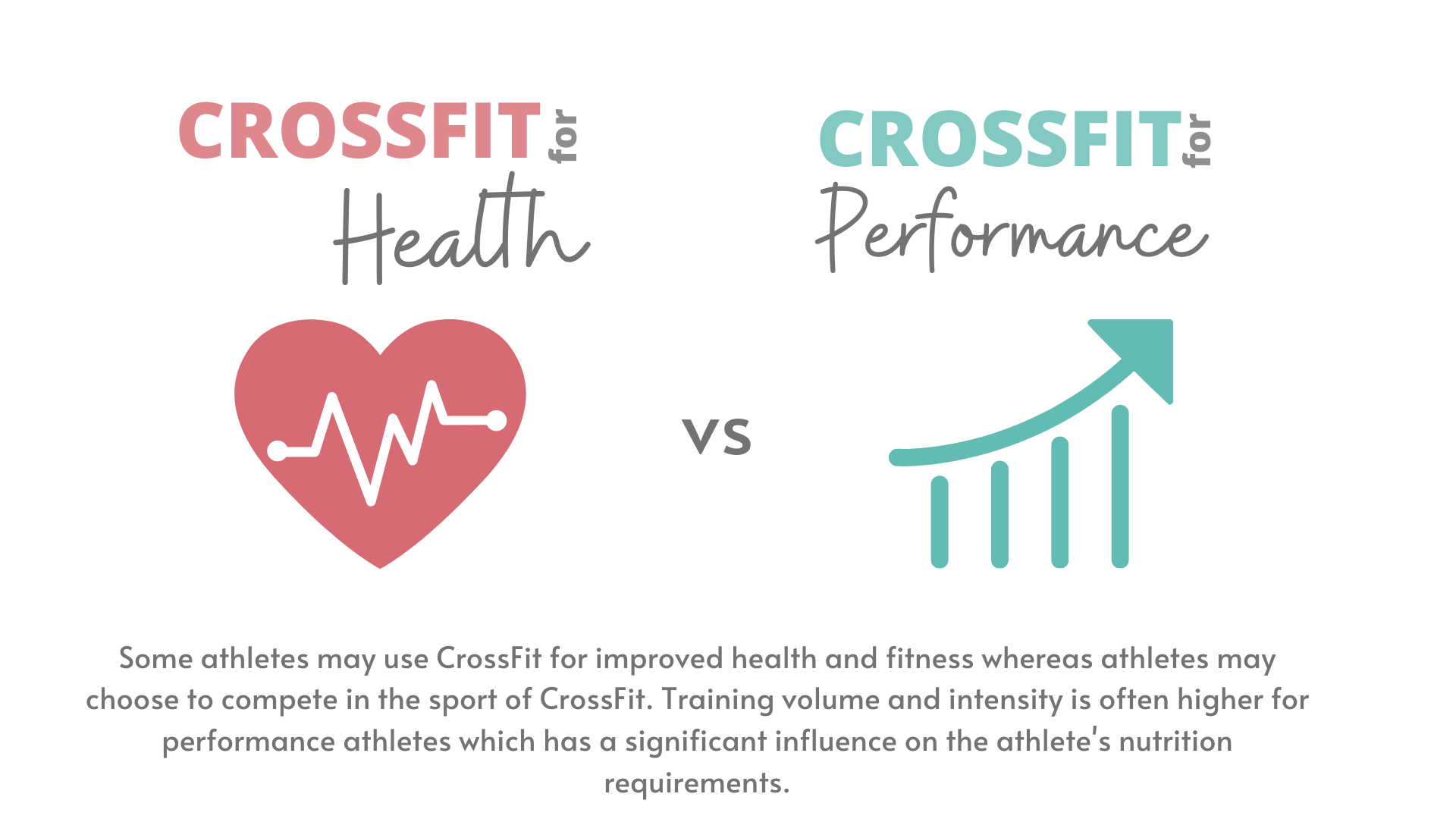
MACRONUTRIENTS
1. PROTEIN
Total protein requirements range from 1.6 to 2.2g/kg of protein per day (ie. 0.7-1.0g of protein per pound of body weight) for athletes engaging in resistance training which includes CrossFit athletes.
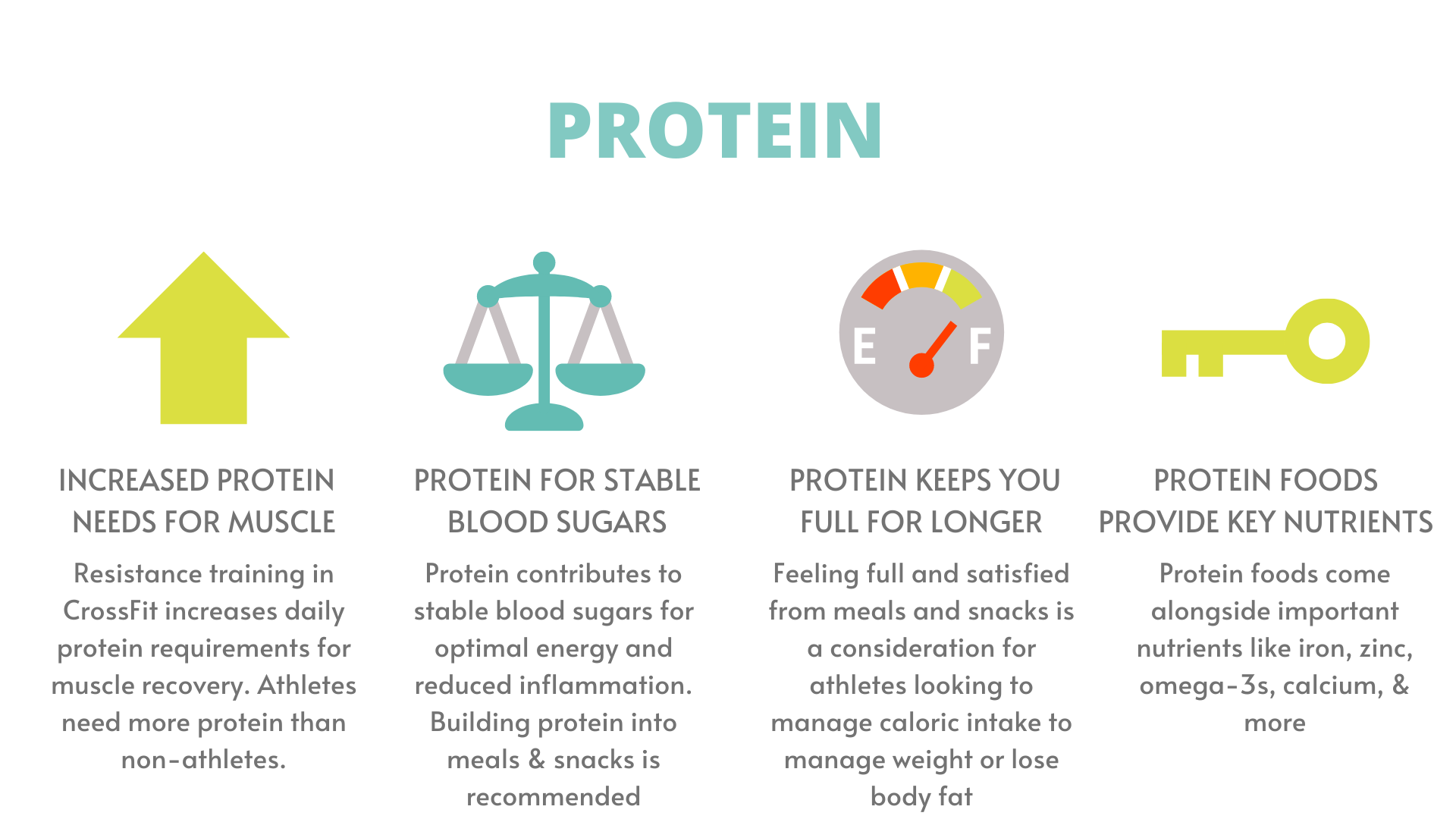
Key considerations regarding protein for CrossFit nutrition:
- CrossFit increases protein requirements. CrossFit programming includes resistance training. Resistance training increases protein requirements as protein provides the amino acids required to maintain and build muscle.
- Protein keeps blood sugar stable. Protein helps to keep blood sugars stable for optimal energy and reduced inflammation. Since blood sugar balance is key to optimize workout performance and recovery, it is important that CrossFit athletes build meals and snacks around protein.
- Protein keeps you full for longer. Protein helps to keep the athlete feeling full for longer due to prolonged digestion rate. Feeling full from meals is especially important for athletes looking to manage calorie intake to facilitate changes to body composition (eg. losing body fat)
- Protein foods provide key nutrients. In addition to providing amino acids, protein foods offer key nutrients including zinc, iron, b vitamins, calcium, omega-3s, and more
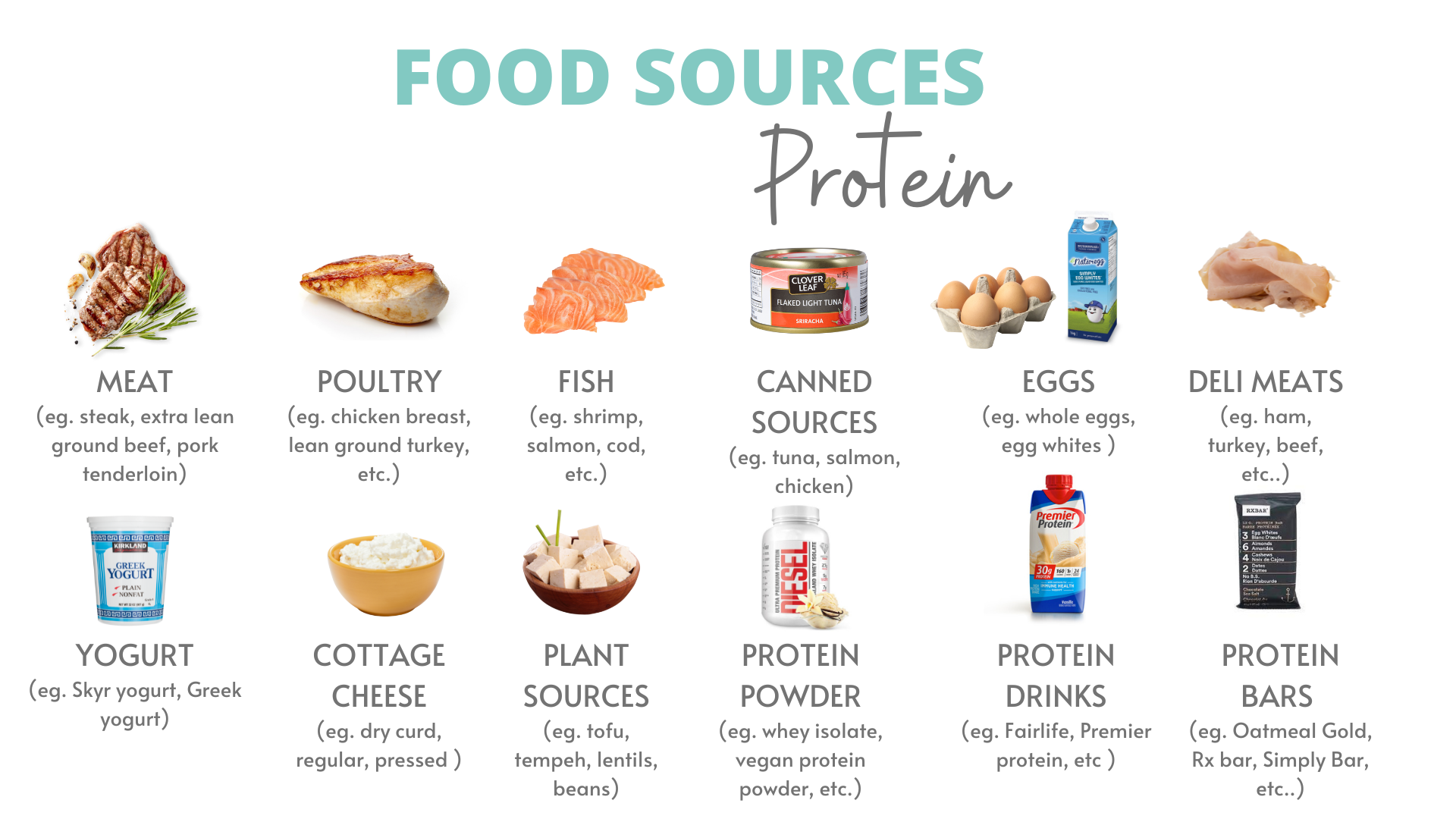
2. CARBOHYDRATES
Total carbohydrate requirements are arguably the most variable between CrossFit athletes. To quantify the variability, an individual involved in a general fitness program (ie. regular CrossFit class WODs) may require only 3g/kg of carbohydrates per day compared to a performance focused athlete who may need 5-8g/kg of carbohydrate per day. The key takeaway being that increased training volume and intensity increases the need for carbohydrate in the diet to optimize performance and recovery!
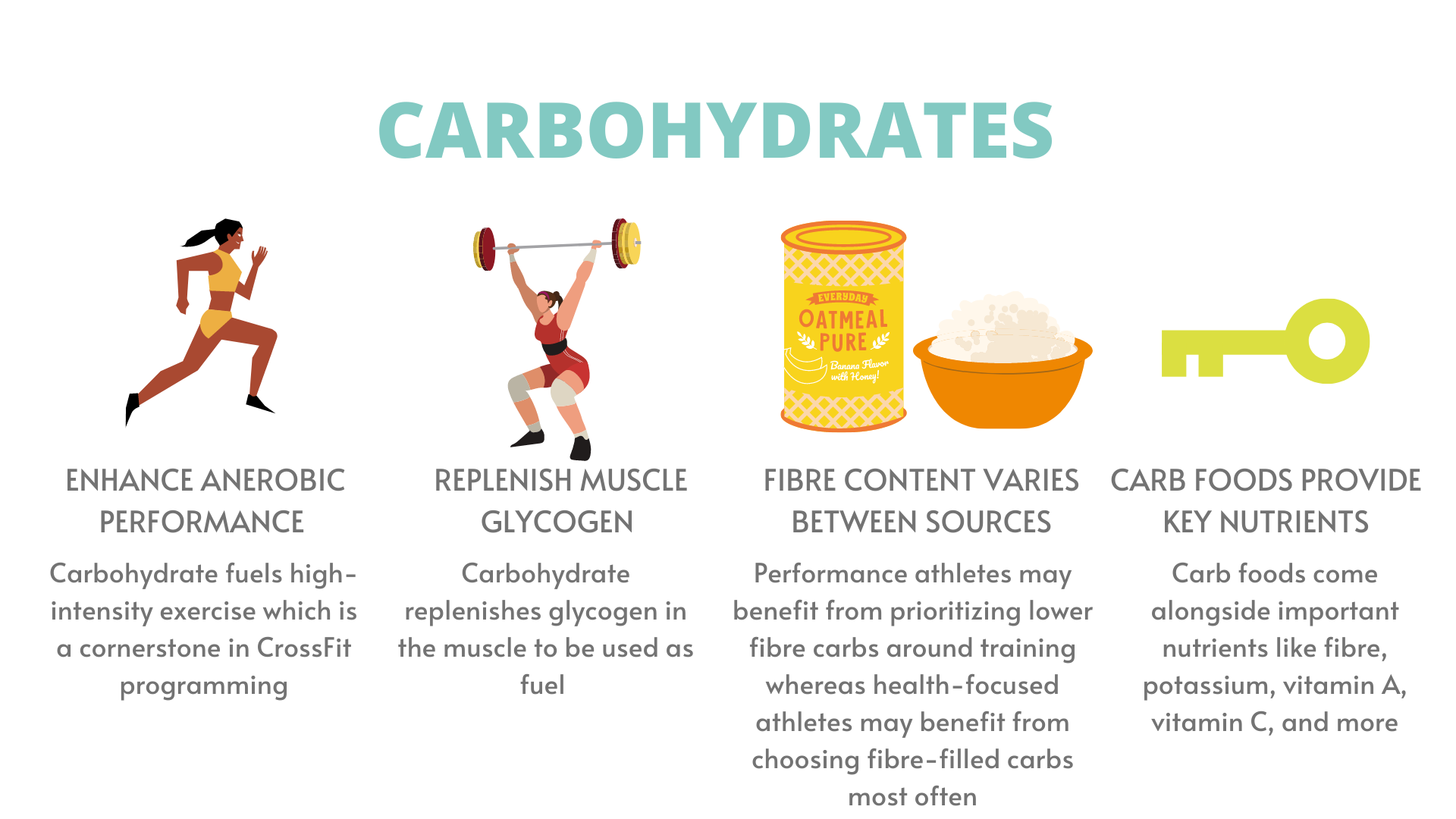
Key considerations regarding carbohydrates for CrossFit nutrition:
- Carbohydrate are the primary fuel for high intensity exercise. Carbohydrates are an immediate source of energy for the body and are the optimal fuel source for high-intensity workouts. Many CrossFit training sessions include high-intensity bouts meaning that most CrossFit athletes benefit from including adequate carbohydrate timed around their training.
- Carbohydrate replenishes muscle glycogen. Carbohydrates are stored in the muscle as glycogen (ie. muscle energy). Consuming carbohydrate throughout the day serves as an energy source and also replenishes muscle glycogen that has been depleted during training sessions.
- Carbohydrate content varies between sources. Carbohydrates can be found in smaller amounts in foods like vegetables and berries and in higher amounts in starches, grains, and fruits like potatoes, rice, bread, quinoa, apples, bananas, and more. Higher carbohydrate sources are a priority around training and for performance focused athletes.
- Lower-fibre carbs may optimize performance for some athletes. Performance-focused athletes may need to prioritize fast digesting, low-fibre carbohydrates around their workouts to optimize energy and digestion during training.
- High-fibre carbs are beneficial to include. Choosing fibre-filled carbohydrates, especially outside the workout window, support blood sugar balance which can improve energy levels, increase satiety, and reduce the risk of chronic disease.
- Carbohydrate foods provide key nutrients. In addition to providing glucose for the brain and muscles, carbohydrate foods offer key nutrients including b vitamins, potassium vitamin A, vitamin C, fibre, and others.
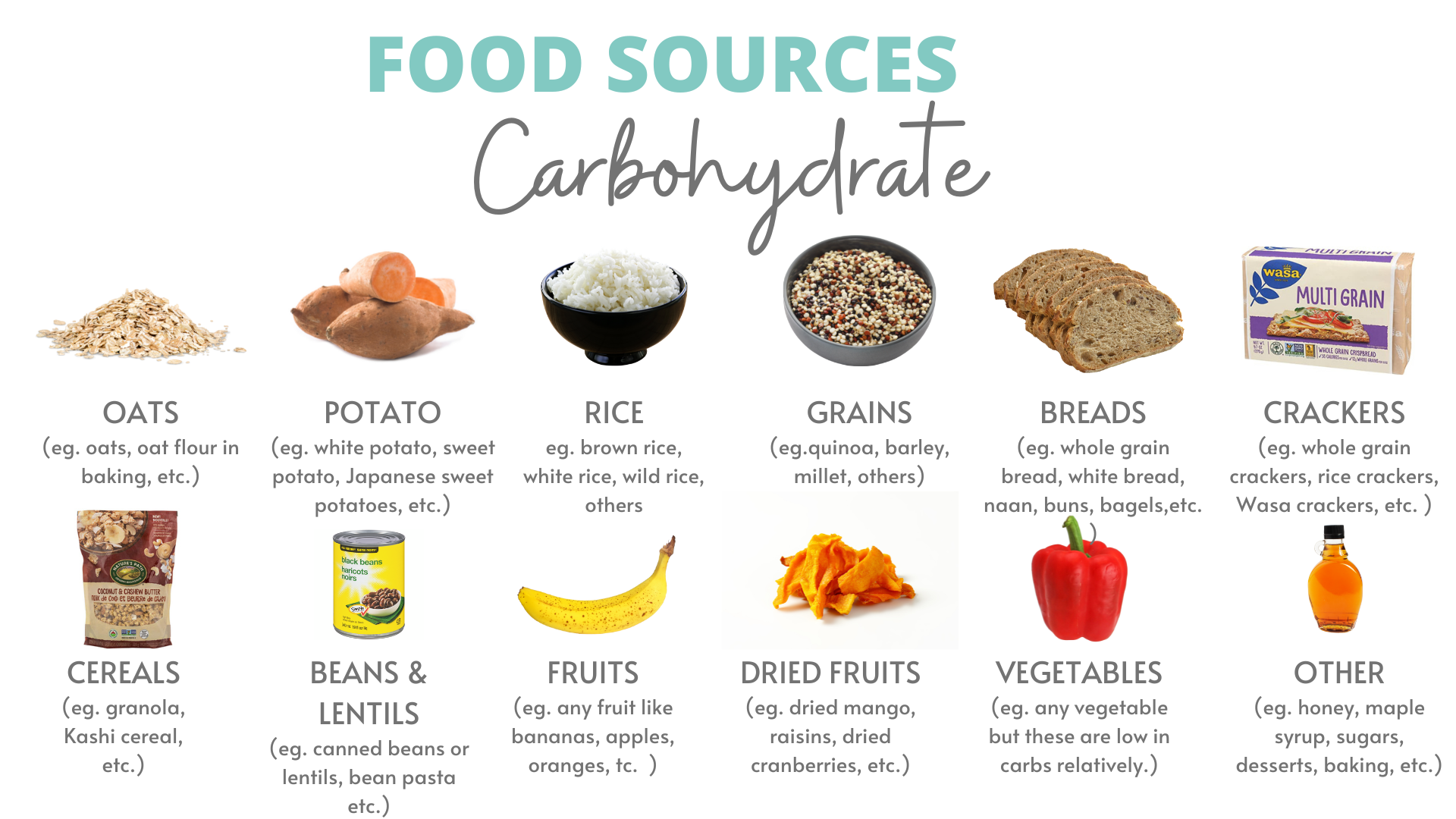
3. FATS
As Registered Dietitians, we’ve found around 1.0g/kg of fat per day to be an optimal starting recommendation with more or less being optimal for higher or lower calorie (ie. energy) requirements. For example, an athlete looking to lose body fat may temporary consume a lower fat diet to reduce their caloric intake whereas an athlete looking to maintain or gain weight may benefit from additional fats to increase their calorie intake.
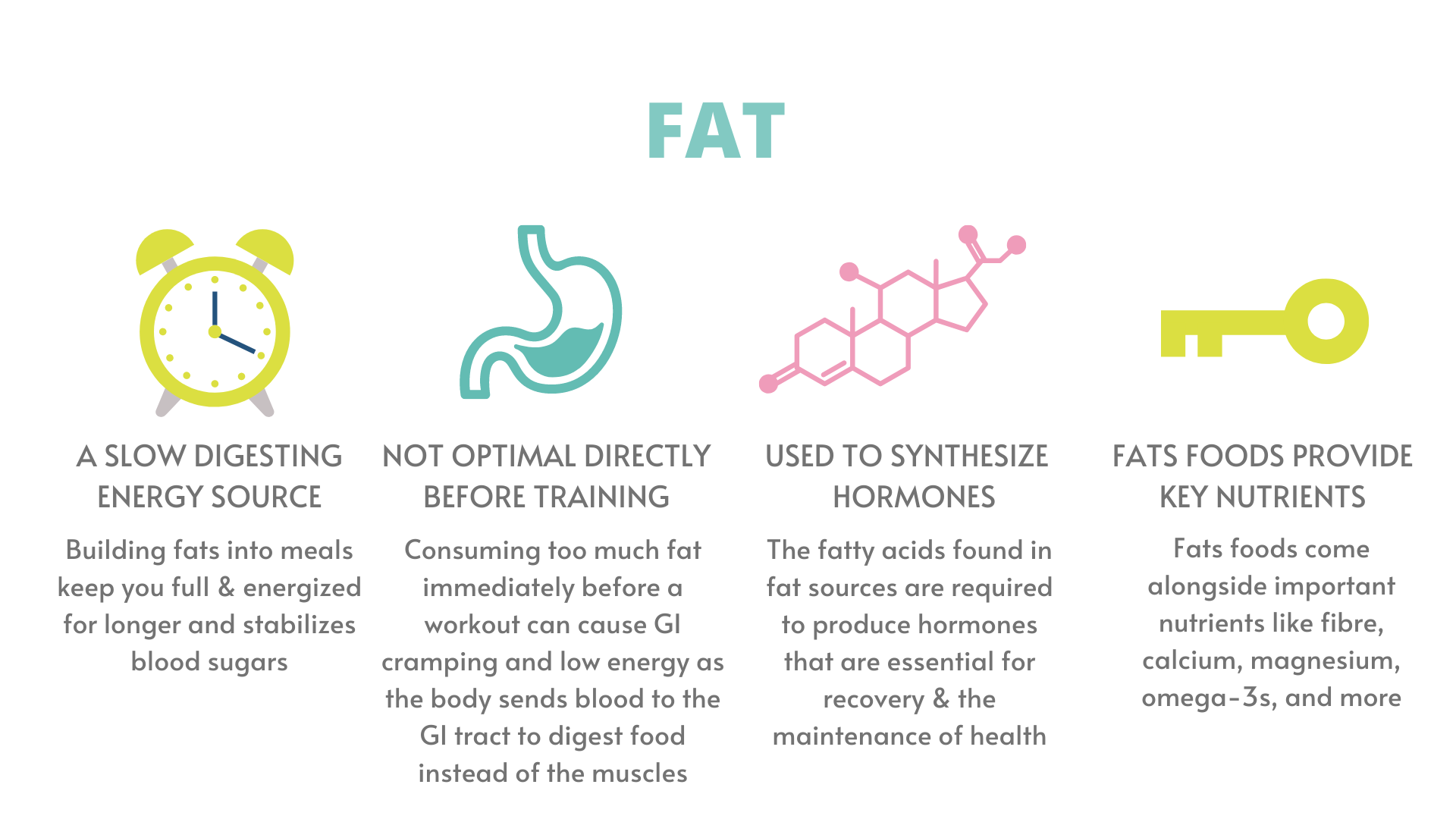
Key considerations regarding fat for CrossFit nutrition:
- Fat is a slow-digesting energy source. Building fats into meals and snacks helps to support blood sugars for optimal energy and reduced risk of chronic disease. As Registered Dietitians, we recommend that CrossFit athletes build fats into most meals.
- Fats are not an optimal fuel source immediately before training. Fats have a prolonged digestion rate and may not be optimal to consume in high amounts immediately before training sessions. For example, a high fat meal can cause digestive distress (eg. cramping) or low energy during the training session.
- Fats are needed to produce hormones. The fatty acids found in fat sources are required to naturally produce hormones that are beneficial for recovery including human growth hormone.
- Fats provide key nutrients. In addition to provide fatty acids, fat source provide key nutrients including magnesium, calcium, omega-3s, fibre, and more
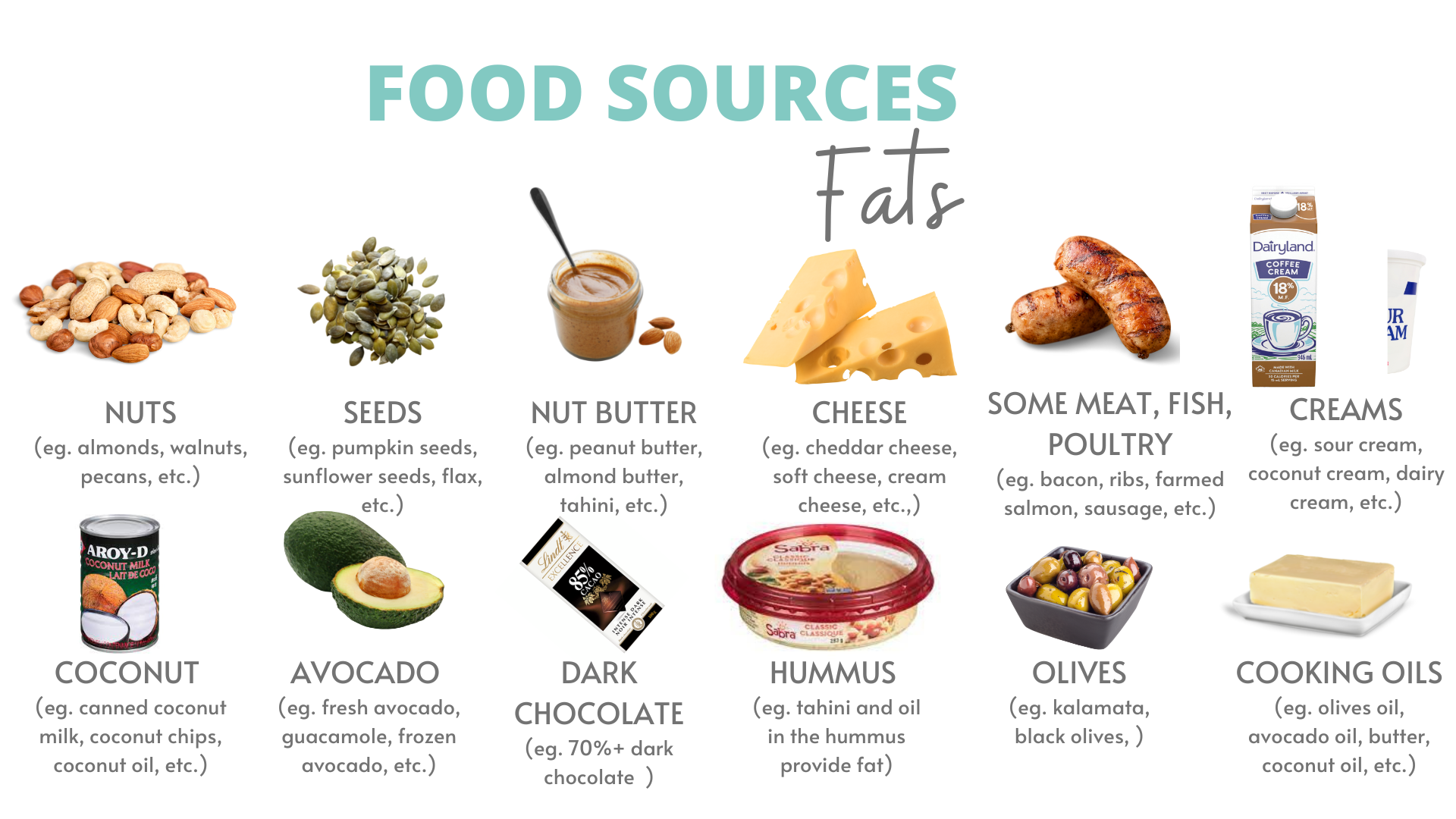
4. ENERGY BALANCE (ie. calories)
Each of the macronutrients, carbohydrate, protein and fat, has a unique set of properties that influence health and performance but each are a source of energy. This means the amount of protein, carbohydrate, and fat consumed by the athletes makes up their total calorie (ie. energy) intake.
As Registered Dietitians, we work closely with health or performance focused athletes to adjust their calorie and macronutrient intake for their specific goals. Such goals might include body recomposition (ie. losing body fat and building muscle), gaining muscle, gaining weight, improving recovery, or increases energy throughout the day and during workouts.
Adjusting calorie and macronutrient intake can be facilitated by tracking food in Apps (eg. MyFitnessPal) or creating a strategic menu planning template with appropriate foods sources and portions for the individual’s unique goals and food preferences.
2. MICRONUTRIENTS
Micronutrients, including vitamins and minerals, are one of the major groups of nutrients the body needs for key functions including energy production, immune function, bone formation, fluid balance, and more.
Your body needs smaller amounts of micronutrients relative to the macronutrients (ie. carbohydrate, fat, and protein) which is why they are labeled “micro”.
Obtaining these key micronutrients is essential for the health, performance, and recovery of the CrossFit athlete. This article won’t cover the specifics of each essential vitamin and mineral, however, the following principles can be used to obtain the range of micronutrient your body needs to function optimally:
- Diversify your food sources. Diversifying your food choices means to choose variety within each of the macronutrient categories explored in the first section. For example: if you chose to eat eggs as a source of protein at breakfast, you might consider choosing a different source of protein at lunch like tuna, chicken, or cottage cheese. By varying your sources throughout the day you obtain a wider variety of nutrients.
- Eat the rainbow. Each color is associated with unique vitamins, minerals, and antioxidants. For example, green foods like spinach, broccoli, or kale are a source of magnesium and calcium. Orange foods like sweet potato, cantaloupe, and oranges are a source of potassium and vitamin A.
- Supplement with vitamin D. Vitamin D is a vitamin that can be sourced through foods, fortified food, and the sun. Vitamin D is naturally found in salmon and eggs, is added to select foods in Canada including dairy milk, plant-based milks, and margarine, and can be synthesized through the sun in Saskatchewan from March to November. Unfortunately, vitamin D is difficult to capture through food and synthesis through the sun isn’t achievable in Canada from November to March. For this reason, Registered Dietitians recommend that all Canadians (including CrossFit athletes) supplement with at least 1000 IU of vitamin D.
- Complete regular blood work. Following up annually with your family doctor can ensure the status of select vitamins and minerals is optimized. Blood markers for vitamin D, iron, and B12 can help you determine if supplementing or sourcing additional nutrition through foods would be beneficial. For example, female CrossFit athletes with a regular menstrual cycle have increased iron needs due to training demands and menses. Ensuring their iron status is optimal is key for performance, energy, and overall health.
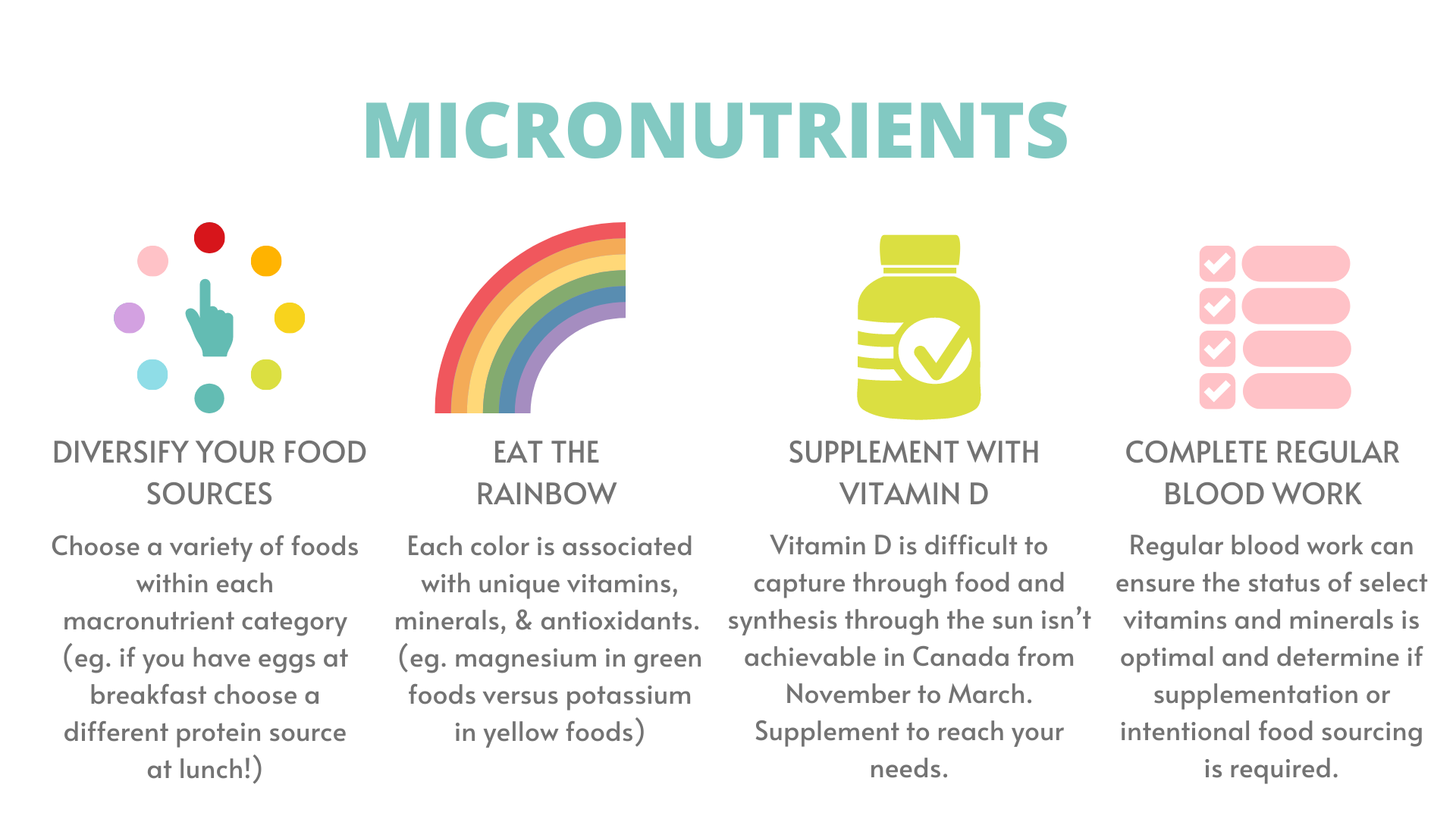
3. MEAL TIMING
We’ve explored what CrossFit athletes need to eat in terms of the three macronutrients. But what about when a CrossFit athlete should eat?
Nutrient timing is a planned alteration of macronutrient intake in order to promote energy, workout performance, and/or recovery! For a complete breakdown of meal timing for sports performance, review our article and accompanying podcast on peri-workout nutrition. Let’s explore key meal timing concepts for CrossFit athletes.
- Eat every 3-5 hours: we recommend that CrossFit athletes eat every 3-5 hours and include protein, fat, and carbohydrate at most meals and snacks. Eating regularly ensures that blood sugar levels (ie. energy levels) remain stable while providing key nutrients like glucose, amino acids, and fatty acids for processes like glycogen replenishment, muscle recovery, and energy production.
- Pre-workout: if you’ve eaten a meal more than 90 minutes to 2 hours before your training session you may benefit from a pre-workout snack. The priority at a pre-workout snack is a source of carbohydrate which will increase blood sugar levels for optimal energy and performance in the training session. If you have >30 minutes to digest the snack before training, we recommend including small amounts of protein and/or fat to slow the breakdown of the carbohydrate source for longer-lasting energy (eg. a banana with a fat source like peanut butter). If you have <30 minutes to digest the snack, we recommend consuming a carbohydrate food alone to optimize energy and prevent digestive distress (eg. a banana)
- Intra-workout: Athletes training for >90 minutes may benefit from intra-workout nutrition (ie. eating during training). A source of easy-to-digest, intra workout carbohydrate provides a source of glucose to fuel the brain and muscles. Easy to digest carbohydrate sources include rice cake, dried fruit, bananas, candies, fruit squeeze, or liquid nutrition (eg. juice, coconut water, or Gatorade). For example, if an athlete was doing 30-60 minutes of strength training and then an hour long CrossFit class they may benefit by having an intra-workout carbohydrate source between their strength training session and conditioning session. Athletes doing an hour training session (eg. the class WOD) do not require intra-workout nutrition.
- Post-workout: Post-workout nutrition can include a post-workout snack or the meal you have within 90 minutes of your training session. Athletes who train multiple times a day may benefit from consistently choosing a post-workout snack that includes a source of protein and carbohydrate. For example, a banana or rice cakes and a protein shake. However, a post-workout snack may not be necessary if the athlete is able to prioritize a post-workout meal that prioritizes protein and carb within 90 minutes of the session.
- Fasting: Some athletes may choose to train fasted whether it is an attempt to restrict calories for fat loss or because they experience digestive distress when eating before a workout. When it comes to optimizing health and performance, Registered Dietitians currently do not recommend fasted workouts. Fasted workouts can create an energy depleted environment that does not optimize training and can also compromise muscle protein synthesis and hormonal balance.
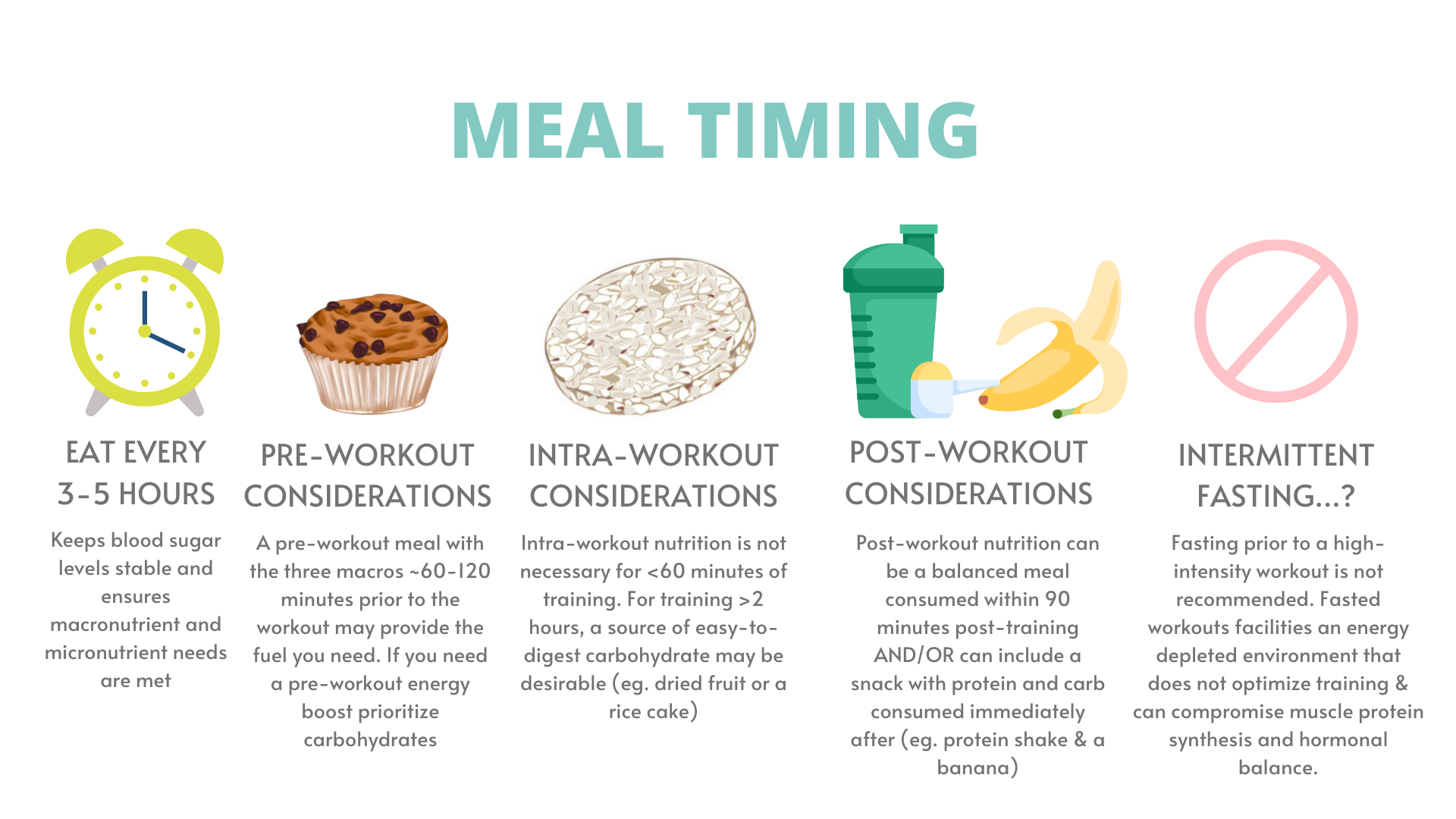
PART 2: SUPPLEMENTATION
Many CrossFit athletes are curious as to whether supplements can help them increase their performance, optimize their recovery, or improve how they feel. While supplements do have their place in your nutrition strategy, they are not a priority. Somewhat ironically, the Registered Dietitians at Vitality Nutrition explain the nutrition hierarchy of importance as an ice cream sundae.
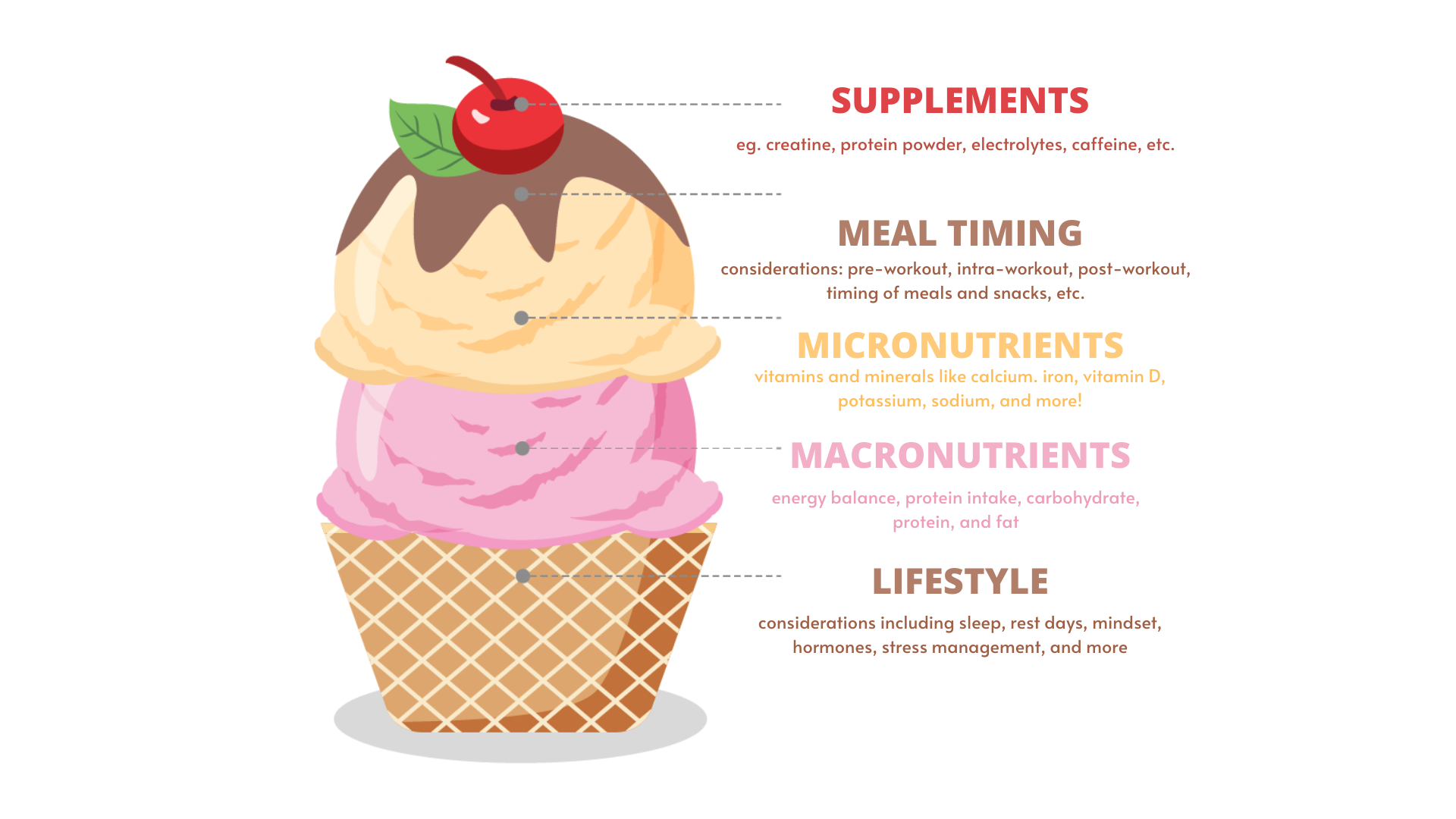
Let’s explore the Vitality Nutrition hierarchy of importance when it comes to training, performance, recovery, and optimizing health:
- Lifestyle Habits: lifestyle habits including sleep, stress management, mindset, and community are like the bowl. They provide the foundation onto which we build!
- Macronutrients & Energy Balance: the ice cream in the bowl is the main priority and includes whole food sources of protein, fats, and carbohydrates discussed in section one which provides key macronutrients and micronutrients.
- Micronutrients: The chocolate sauce is an important addition to the ice cream sundae but isn’t useful without the ice cream as the base. This can be likened to meal timing which is an important consideration but not to be prioritized over optimal macronutrient and micronutrient intake.
- Supplements: Supplements are like the cherry on top of the ice cream sundae meaning they are rarely effective unless baseline nutrition strategies including macronutrients, micronutrients, and meal timing are optimized. Only when the base is prioritized do supplements offer additional benefits!
With the understanding that supplements are only beneficial if our foundational nutrition principles are first optimized, let’s explore four supplements that Registered Dietitians may recommend to CrossFit athletes:
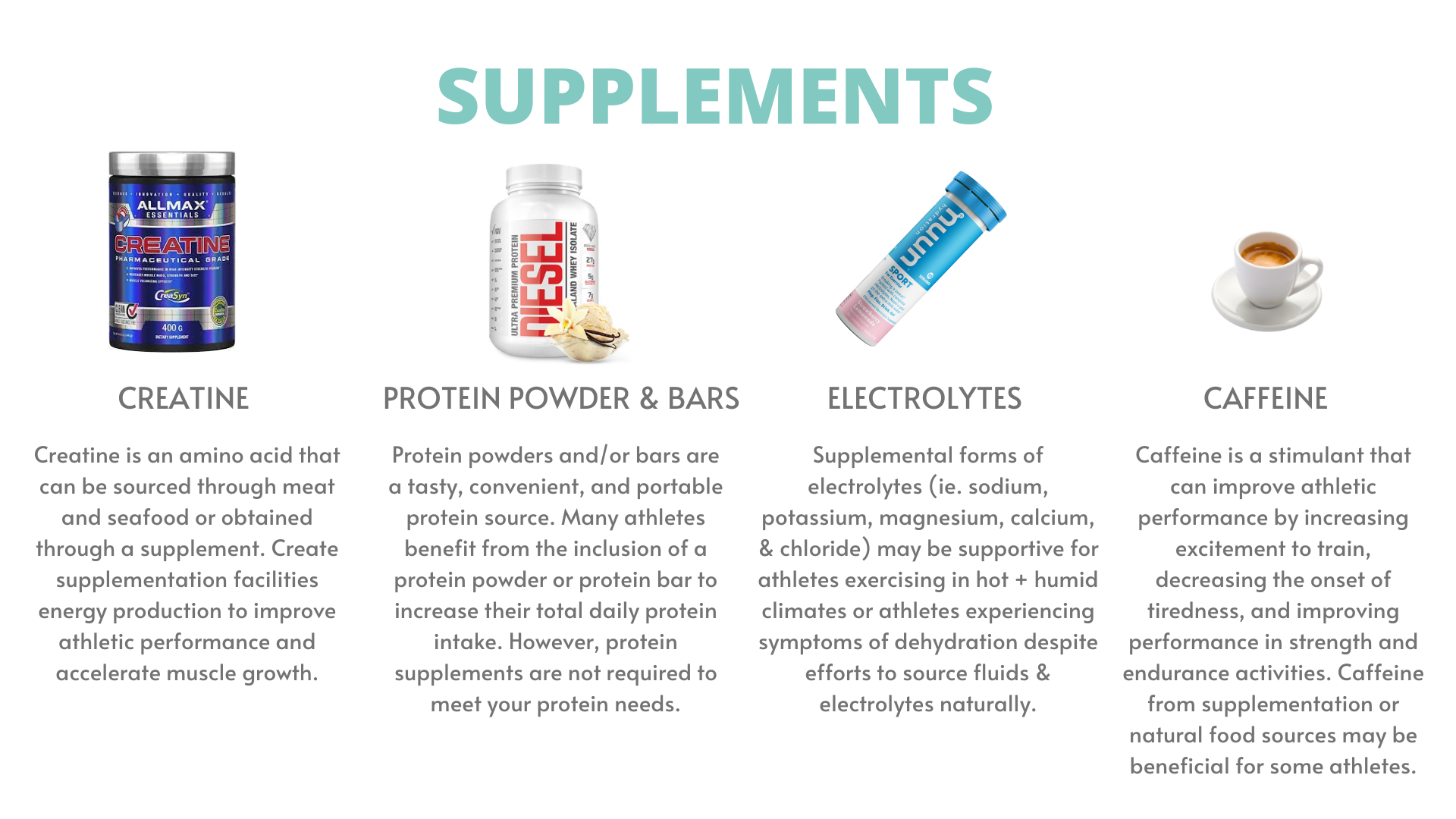
CREATINE:
Creatine is a non-protein amino acid that is stored in muscle tissues with a phosphate group. When the body needs to produce a large amount of energy quickly, such as in a heavy lift or a sprint, the phosphate part of the creatine molecule is split off. The phosphate molecule is then used to produce energy (ATP). The more creatine that is available, the more energy is able to be produced. This rapid production of energy when training enables greater high-intensity performances leading to increases in strength and muscle mass.
Creatine can be created in the body, sourced from foods like meat and seafood, or taken in supplement form. Creatine supplementation has been proven to be beneficial for athletes who strength train, which includes CrossFit athletes. Speak to a Registered Dietitian about creatine supplementation including how much to take.
PROTEIN POWDER
Protein powders are concentrated sources of protein from animal or plant foods such as dairy, eggs, rice or peas. As discussed in the macronutrient section, CrossFit athletes have increased protein needs due to the inclusion of strength training in the program. While CrossFit goers can obtain adequate protein from food sources alone, many athletes benefit from protein powders to reach optimal levels. Some key benefits and considerations for CrossFit athletes:
- Convenient: protein powders in the form of drinks and bars can be a convenient snack or meal for many athletes (eg. adding protein powder to oats when traveling, enjoying a protein bar as an on-the-go snack, or integrating protein powder into a morning smoothie!)
- Post-workout digestibility: athletes with a goal to gain weight or muscle mass may benefit from a post-workout snack immediately after their workout that contains easy-to-digest sources of protein. A post-workout protein shake can be a suitable option for athletes looking to integrate post-workout nutrition immediately after their training.
- Taste: many of the protein powders and bars on the market are tasty. For example, the addition of a satisfyingly sweet protein power to a smoothie or a tasty protein bar at a snack! Having tasty and enjoyable sources of protein can assist athletes in reaching their protein goals!
- Vegetarians or vegans: may find it difficult to obtain adequate protein levels through whole foods alone. Vegetarian sources of protein (eg. whey) and vegan sources (eg. pea or brown rice) may be supportive for athletes looking for alternative sources to increase their protein intake.
- Intolerances: when choosing a protein powder or bars, some athletes may need to take caution with personal food intolerances like lactose, sugar alcohols, synthetic fibers, etc. to ensure digestion is optimized.
ELECTROLYTES
Electrolytes are most known for their role in regulating fluid balance and hydration status. Electrolytes are also involved in body processes like regulating the function of muscles, cells, and nerves. Therefore, adequate hydration status through fluids and electrolytes is key to prevent symptoms of dehydration which can be detrimental to athletic performance.
The symptoms of dehydration include fatigue, muscle cramping, headaches, heart palpitation, and poor recovery. Electrolyte needs increase when engaging in high intensity largely due to increased fluid and electrolyte losses through sweat.
While electrolytes can be obtained by consuming a variety of whole foods, many CrossFit athletes benefit from supplementing with the electrolytes for optimal hydration, performance, and recovery. Supplementation is especially beneficial when exercising in a hot and humid climate when sweat rate increases.
When choosing an electrolyte supplement, source a product that contains sodium, potassium, magnesium, calcium, and chloride. Work directly with a Registered Dietitian to optimize the specific ratios of electrolytes found in supplements. Some examples of electrolyte supplements available in Saskatchewan include Nuun tablets and Organika Electrolyte.
CAFFEINE
Caffeine is a stimulant that can be found naturally in foods like coffee, green tea, and chocolate or added to products like pre-workouts and energy drinks. It works by stimulating the brain and central nervous system, helping you stay alert and prevent the onset of tiredness.
Studies correlate caffeine to increased exercise performance in endurance activities, as well as its possible ergogenic effects for both intermittent and strength activities. As Registered Dietitians, we recommend consuming no more than 400mg of caffeine per day from natural sources and supplements. Work directly with a Registered Dietitian to determine how or whether caffeine supplementation could benefit your workout performance and goals!
PART 3: FACTORS THAT IMPACT RECOVERY
Exercise places your body under substantial stress and this ‘good’ stress is necessary for your body to adapt and change to occur. However, just as your body has to be stressed to change, it needs adequate time for exercise recovery as well. Without adequate recovery, your body can’t completely repair the damage that muscle fibers sustain so that growth can occur.
Nutrition plays a vital role in recovery as it provides the building blocks to build hormones, recover muscle tissue, replenish glycogen stores, and more. As Registered Dietitians, we not only support our clients in optimizing their nutrition protocols for recovery but also help them develop habits and awareness around their sleep, rest days, hydration, hormones, and more. Some considerations:
- Sleep: In addition to being essential to the recovery process, adequate sleep improves athletic performance and decreases injury risk. Athletes need more sleep than non-athletes. As Registered Dietitians, we find most adult athletes require between 7-9 hours of sleep to optimally recover and perform. Optimizing sleep routines and environments is a key consideration for CrossFit goers. As Registered Dietitians, we work closely with our athletes to design a nutrition protocol that facilitates optimal sleep. This can include experimenting with whether a bedtime snack is sleep supportive for the athlete.
- Stress Management: CrossFit places stress on the body and with adequate recovery protocols in place the body can adapt to the stress and become fitter, faster, and stronger. However, if training and life stressors are not well managed, high levels of cortisol can create a catabolic environment that does not promote recovery. Furthermore, elevated cortisol can cause disturbances to appetite, sleep, mood, digestion, and hormone health.
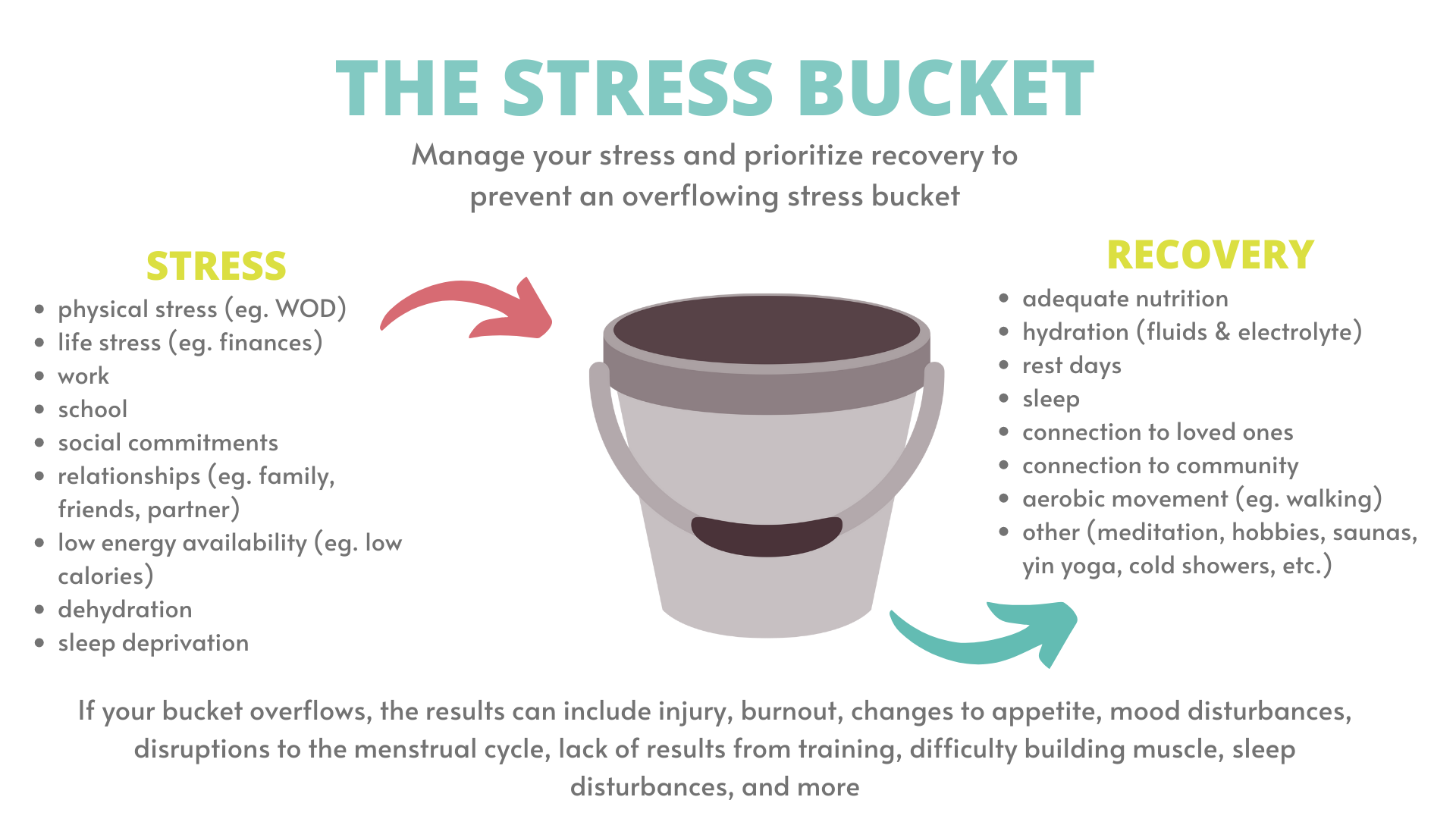
- Rest Days: It's essential to give your body enough time spent not training to replenish your energy (glycogen) stores and allow your damaged muscles to recover. Otherwise, your performance will be compromised and you likely will not experience the full benefits of your training. As Registered Dietitians, we work closely with our athletes to plan their nutrition around their training and rest days. It's important to note that nutrition needs do not necessarily decrease on a rest day and consuming regular meals and snacks is necessary to provide the recovering body what it needs to replenish and rebuild.
- Hormones: Female athletes may want to consider their menstrual cycle when planning their nutrition, rest days, and training. Nutrition requirements may be different in the luteal phase of the cycle (ie. the 1-2 weeks before the period) and food intake may need to change during this phase. Furthermore, decreases in energy levels may warrant adjustments to training intensity and rest days. In our nutrition coaching program, we work closely with our female athletes to track trends in their menstrual cycle and plan nutrition, training, sleep, and recovery to optimize the delicate balance of hormones across their cycle.
BONUS: MENU PLANNING EXAMPLE FOR CROSSFIT
Let’s consider a general menu planning example that puts the recommendations from this article into action. Specific food portions and meal timing will be dependent on the individual's workout schedule and unique macronutrient and calorie requirements.
You can download the menu plan for easier viewing here or review it in the photo below!
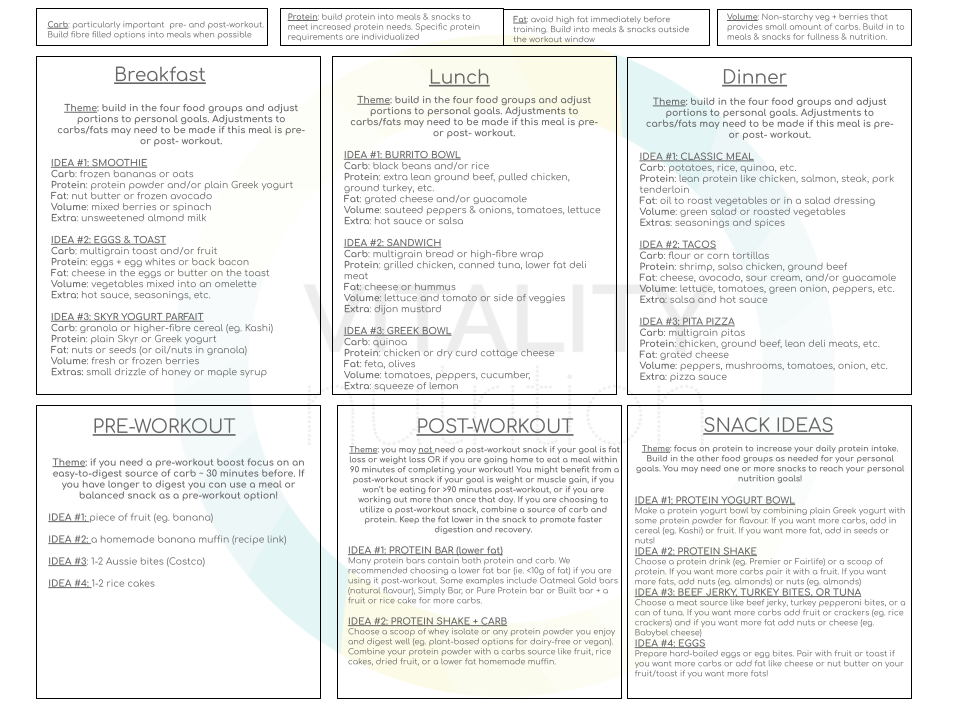
CONCLUSION:
Our Registered Dietitians in Saskatchewan work closely with health and performance focused athletes to optimize their nutrition, supplement, and recovery routines. If you are looking to develop a unique strategy to reach your CrossFit goals then we suggest reaching out to one of the dietitians on our team here to create a nutrition protocol designed for your unique needs! Some key takeaways:
- Macronutrients:
- Protein: CrossFit athletes have increased protein needs to build and repair muscle tissue. Build protein into meals and snacks to four or more feedings across the day.
- Carbohydrates: Carbohydrate requirements widely variety based on the individuals goals, training volume, and training intensity. Plan carbohydrate around workout sessions.
- Fats: Fats support vital bodily processes. Build fat into meals and snacks but avoid high-fat foods immediately before training to avoid digestive upset and fatigue.
- Energy balance: The amount of protein, carbohydrate, and fat you consume make up your total energy (ie. calorie) intake. Athletes may choose to intentionally adjust their caloric intake for specific goals like losing body fat, gaining weight, or maintaining weight.
- Micronutrients: vitamins and minerals are essential for vital bodily processes like energy production, immune function, bone formation, and more. Some strategies to meet your micronutrient intake.
- Diversify your food choices to obtain a wider range of vitamins and minerals
- Eat a rainbow of produce to ingest unique nutrients that each color provides (eg. orange for vitamin C, potassium, and vitamin A or green for magnesium, calcium, and vitamin K)
- Supplement with vitamin D to meet your needs because this nutrient is difficult to source in adequate amounts through food alone.
- Complete regular bloodwork to detect potential micronutrient deficiencies that may warrant intentional food sourcing or supplementation
- Meal timing:
- Eat a mix of protein, carb, and fat regularly throughout the day (ie. every 3-5 hours) to keep blood sugar stable and provide key amino acids, glucose, and fatty acids for optimal energy and recovery.
- Plan pre-, intra-, and post-workout snacks based on individual factors like meal spacing, workout duration, and energy needs.
- Fasting prior to high intensity workouts is not recommended for optimal health and performance. Consider planning a pre-workout snack or meal prior to training.
- Supplements: supplements like creatine, protein powder, electrolytes, or caffeine may be beneficial for athletes looking to optimize performance and recovery.
- Recovery Considerations: factors outside of nutrition including sleep, stress levels, rest, and hormones influence appetite, performance, and recovery.
If you’re looking for guidance to put these recommendations into action, download our free menu planning resources. This menu plan does not address individual nutrition needs but will support you in learning how to plan meals suited to support energy, performance, and recovery in CrossFit.
Ready to bring the evidence-based nutrition support of our Registered Dietitians into your kitchen?
Hungry for more?
Get recipes, tips, and updates from the Vitality Nutrition team straight to your inbox!
Don't worry, your information won't be shared.

